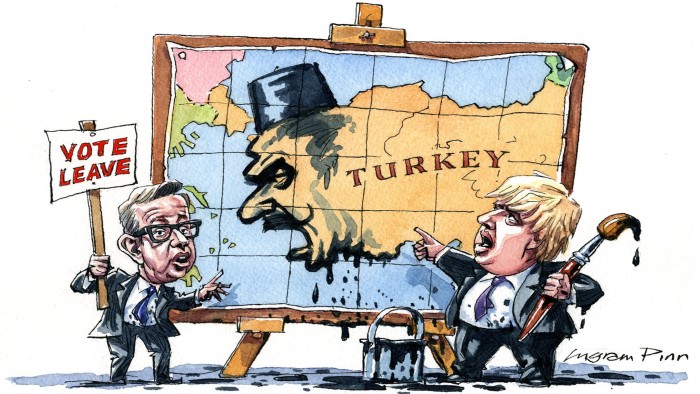The Brexiters’ ugly campaign to vilify Turks

Roula Khalaf, Editor of the FT, selects her favourite stories in this weekly newsletter.
Flick through the campaign material of the Brexiters fighting Britain’s EU referendum and you will find a video of a brawl in the Ankara parliament. Next, a poster with an image of a UK passport declaring that “Turkey (population 76m) is joining the EU”. Then statistics about Turkey’s high birth rate; and a warning that Britain’s National Health Service will soon be swamped by expectant Turkish mothers.
After this follows the assertion — unsubstantiated, of course — that Turkey has higher levels of criminality and gangsterism; and a map showing that Ankara’s supposedly imminent accession will extend Europe’s external frontier to war-ravaged Syria. None of this needs decoding. The dog whistle has made way for the klaxon. EU membership talks with Turkey, we are to understand, will soon see Britain overrun by millions of (Muslim) Turks — most of them thugs or welfare scroungers.
In the US, the Republican presidential candidate Donald Trump says all Muslims must be treated as suspect. The Conservative Leave campaign, led by Boris Johnson and Michael Gove, has chosen to cast the entire Turkish nation as the enemy. Mr Trump plans to ban Muslims from entering the US. Britain’s response to the Turkish “threat”, the Brexiters say, should be to quit the EU and pull up the drawbridge.
There was always a danger that the referendum campaign would bleed into xenophobia. The UK Independence party, led by Nigel Farage, has never bothered itself with policing the boundary between legitimate debate about immigration and straightforward racism. The surprising thing has been the enthusiasm of the Tory-led Vote Leave campaign, which once presented itself as the reasoned face of Euroscepticism, in marching on to Ukip’s territory.
Mr Johnson is a former mayor of London, the most cosmopolitan of the world’s great cities, whose all-consuming ambition is to replace David Cameron as prime minister. Mr Gove is the minister responsible for oversight of the rule of law in Mr Cameron’s cabinet. Both had previously presented themselves as social liberals. Mr Johnson had even boasted of his family’s Turkish ancestry — his paternal great-grandfather went by the name Ali Kemal Bey — and not so long ago he was a vociferous supporter of Turkey’s EU entry.
Now, he represents the citizens of his ancestral home as a civilisational threat. As the Leave campaign puts it, “Murderers, terrorists and kidnappers from countries like Turkey could flock to Britain if it remains in the European Union”. As repugnant as they are, Mr Trump’s views on Islam are directly stated. Mr Johnson lets the Islamophobia hang in the air.
The obvious riposte is that there is no prospect of Turkey joining the EU in the foreseeable future. Mr Cameron has made just this point. Ankara first applied to join during the 1960s and opened talks with Brussels in 2005. During the past decade only one of 35 accession chapters has been completed. Each of the existing EU states holds a veto and any decision would be subject to
referendums in several that are overtly hostile to Turkey’s accession. Even if, inexplicably, all those hurdles were somehow surmounted, entry would be followed by lengthy transitional arrangements. We are talking, if it ever happens, several decades from now.
Yet none of this deters Messrs Johnson and Gove from insisting, absurdly, that Turkey could be a full EU member by 2020. The Brexiters operate outside anything as old-fashioned as a framework of truth. Fiercely anti-intellectual, and borrowing heavily from Mr Trump, they judge that rational argument is best met with shameless mendacity.
They have exploited, it is fair to say, the cynicism of successive British governments in dealings with Turkey. Mr Cameron is not the first prime minister to seek commercial and political credit in Ankara by publicly backing EU entry in the certain knowledge that others will ensure it does not happen. Germany’s chancellor Angela Merkel has embraced the same unattractive realpolitik in striking a deal with Ankara to halt the flow of Syrian refugees.
The sharp authoritarian turn of president Recep Tayyip Erdogan’s government has dismayed, meanwhile, the staunchest supporters of Turkey’s eventual EU accession. The avowed democrat of a decade or so ago now resides in a palace fit for Louis XIV and wants to dispense with all constraints on his personal power — another reason why EU entry has receded from view.
The Outs, though, are not directing their fire at Mr Erdogan. Their target is the Turkish people. The crude calculation is that demonising Turks adds a useful xenophobic edge to a populist campaign against the Brussels-backing elites. The aim is to harden support for the anti-EU cause among working-class voters marginalised by globalisation. Marine Le Pen, the leader of the far-right National Front and an avowed supporter of Brexit, has done much the same in France.
The painful irony is that in “playing the Turkish card” the Outs debauch the democracy they say they want to rescue from the clutches of the EU. By stoking prejudice against Turks in particular and Muslims in general, they throw away the liberal tolerance that has long defined Britishness. Mr Johnson may think that this is the way to win the referendum and then claim the keys to 10 Downing Street. But at what price?
Letter in response to this column:
Erdogan’s Ankara palace would have been too vulgar for the Sun King / From Francis Ghilès
Comments